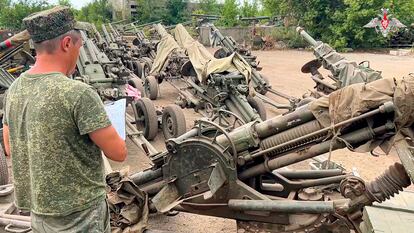Russia’s Defense Ministry says Wagner mercenaries are surrendering their weapons to the military
The move follows the private army’s brief rebellion last month that challenged the Kremlin’s authority

Mercenaries of the Wagner Group are completing the handover of their weapons to the Russian military, the Defense Ministry said Wednesday, a move that follows the private army’s brief rebellion last month that challenged the Kremlin’s authority.
The disarming of Wagner reflects efforts by authorities to defuse the threat it posed and also appears to herald an end to the mercenary group’s operations on the battlefield in Ukraine.
The actions come amid continued uncertainty about the fate of Wagner chief Yevgeny Prigozhin and the terms of a deal that ended the armed rebellion by offering amnesty for him and his mercenaries along with permission to move to Belarus.
Among the weapons turned over were more than 2,000 pieces of equipment, such as tanks, rocket launchers, heavy artillery and air defense systems, along with over 2,500 metric tons of munitions and more than 20,000 firearms, the Defense Ministry said.
The statement follows the Kremlin’s acknowledgment Monday that Prigozhin and 34 of his top officers met with President Vladimir Putin on June 29, five days after the rebellion. Kremlin spokesman Dmitry Peskov said Wagner’s commanders pledged loyalty to Putin and that they were ready “to continue to fight for the Motherland.”
Putin has said that Wagner troops had to choose whether to sign contracts with the Defense Ministry, move to Belarus or retire from service.
The Kremlin’s confirmation that Putin met with Prigozhin, who led troops on a march to Moscow to demand the ouster of the country’s top military leaders, raised new questions about the deal that ended the rebellion.
Putin denounced the revolt as an act of treason when it started and vowed harsh punishment for those who participated in it, but the criminal case against Prigozhin was dropped hours later as part of the deal. At the same time, the Wagner chief apparently could still face prosecution for financial wrongdoing or other charges.
Belarusian President Alexander Lukashenko, who brokered the deal that ended the mutiny, said last week that his country offered Wagner field camps but noted that Prigozhin was in Russia and that his troops remained at their home camps. Lukashenko noted that their deployment to Belarus would depend on decisions by Prigozhin and the Russian government.
During the revolt that lasted less than 24 hours, Prigozhin’s mercenaries quickly swept through the southern Russian city of Rostov-on-Don and captured the military headquarters there without firing a shot before driving to within about 200 kilometers (125 miles) of Moscow. Prigozhin described it as a “march of justice” to oust the military leaders, who demanded that Wagner sign contracts with the Defense Ministry by July 1.
The mutiny faced little resistance and fighters downed at least six military helicopters and a command post aircraft, killing at least 10 airmen. When the deal was struck, Prigozhin ordered his troops to return to their camps.
The rebellion represented the biggest threat to Putin in his more than two decades in power and badly dented his authority, even though Prigozhin claimed the uprising was not aimed at the president but intended to force the ouster of Defense Minister Sergei Shoigu and chief of the military’s General Staff, Gen. Valery Gerasimov.
Both men have kept their jobs. Many observers suggested that even if Putin wasn’t happy with their performance, Prigozhin’s demand for their ouster helped secure their jobs, since firing them would be seen as a concession to the Wagner boss.
At the same time, uncertainty surrounds the fate of Gen. Sergei Surovikin, the deputy commander of the Russian group of forces fighting in Ukraine who reportedly had ties to Prigozhin.
Surovikin hasn’t been seen since the rebellion began, when he posted a video urging an end to it, and two people in Washington familiar with the matter who spoke on condition of anonymity because they weren’t authorized to discuss it publicly told The Associated Press in June that he has been detained. Several Russian military bloggers also said he has been detained and questioned.
Andrei Kartapolov, a retired general who heads the defense affairs committee in the lower house of the Russian parliament, said Wednesday that Surovikin was “resting” and is “not currently available,” but wouldn’t elaborate.
Sign up for our weekly newsletter to get more English-language news coverage from EL PAÍS USA Edition
Tu suscripción se está usando en otro dispositivo
¿Quieres añadir otro usuario a tu suscripción?
Si continúas leyendo en este dispositivo, no se podrá leer en el otro.
FlechaTu suscripción se está usando en otro dispositivo y solo puedes acceder a EL PAÍS desde un dispositivo a la vez.
Si quieres compartir tu cuenta, cambia tu suscripción a la modalidad Premium, así podrás añadir otro usuario. Cada uno accederá con su propia cuenta de email, lo que os permitirá personalizar vuestra experiencia en EL PAÍS.
¿Tienes una suscripción de empresa? Accede aquí para contratar más cuentas.
En el caso de no saber quién está usando tu cuenta, te recomendamos cambiar tu contraseña aquí.
Si decides continuar compartiendo tu cuenta, este mensaje se mostrará en tu dispositivo y en el de la otra persona que está usando tu cuenta de forma indefinida, afectando a tu experiencia de lectura. Puedes consultar aquí los términos y condiciones de la suscripción digital.








































